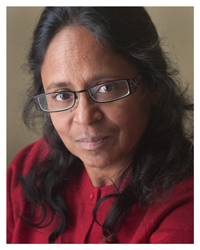
Lived Realities of Race
Three stories capture my take on how race matters.
Story #1 opens in a grocery parking lot. I park my car and open the door. Trying to remember what I need to buy, I do not notice the pick-up truck beside me as I step out. Then, I hear a male voice bellowing at me to close my door and stop ruining his truck. Hurriedly, I close the door. I apologize and check his vehicle for damages. The man shouts a little louder, glares at me, and revs up his engine. He mouths what appears to be a racial slur and drives off.
By now, I, too, am angry. As he looks back at me in his rear view mirror, I give him the finger – twice, for good measure.
What happened illustrates a fear I try to dismiss but live with daily. The man was white, tattooed, and working class in appearance. I am dark-skinned, black-haired, and potentially middle-class in appearance. What he said and did mirrored my fear that people like him see people like me as outsiders, invaders, scourges. We don’t belong. We deserve to be chastised whenever possible.
Story #2 takes place a few days later. My college is hosting the final event in a yearlong series of celebrations of the diverse cultures that comprise America. Events throughout the year paid homage to Native Americans, Latinos, African Americans, and women. Now, it’s time to celebrate Asians and I am speaking.
Because available dates were scarce, a decision was made to combine diversities and celebrate Asians, Jews, and LGBTQs with one event. As part of the planning committee for the event, I welcomed the conjoining of celebrations as an opportunity to look at theories of intersectionality from the lens of lived experience. I had proposed that a Jewish faculty member and a colleague who identified as lesbian speak with me. But we were encouraged to keep our remarks brief and non-academic so the event would be fun. Fun was defined as rainbow-frosted cupcakes, the (unsuccessful) search for a performer who could inhabit all three identities simultaneously (such as a gay Asian rabbi), and an activity that would encourage participants to explore their identities through the creation of collages.
At this event, I tell the story of the parking lot. In doing so, I remark that on the basis of appearances alone, the truck driver had perceived me as foreign and uppity and I had perceived him as white and working class. What, I ask, might have been the situation if it had been a white male of a similar class as myself? How might I have reacted differently?
Story #3 takes place in Ferguson, Missouri. A white police officer shoots an African American male and kills him. Like my encounter in the parking lot, the shooting exemplifies one reality that black males particularly and other individuals of color live with – in a society that claims race does not matter, their lives are constantly at risk.
I did not think my first two stories overlapped with the Ferguson shooting until I read a contribution to this blog from Marcia Y. Riggs. Riggs wrote, “Race matters because the politics of race is a politics of denial.” Race, Riggs noted, “is intrinsic to our lives” and race matters because “the bodies and experiences of our students and ourselves as teachers matter.”
Planning the college diversity event was uncomfortable. I kept feeling as if others thought I was being difficult. I suggested that we use the terms “Asian American” or “Asian Pacific American” in place of “Asian,” but these terms were dismissed as too complex. A scholarly panel on intersectionality was labeled too academic. Increasingly, I felt like an obstacle: I wanted to talk about race and identity; others on the committee wanted to have fun.
I shared the story of the parking lot because it complied with the mandate to be brief. Provocatively, my story launched a dialogue that continued for three quarters of an hour, cutting into the fun.
In avoiding the complexity of race, we miss the chance to explore how we, as a nation, are rich in our diversities of experiences and peoples, and might grow richer still. By treating race as something that does not matter, we dismiss incidents like Ferguson as aberrations instead of moments from which we can teach and learn and grow. The fact that my story stimulated dialogue suggests that confronting race might look less fun on the surface but is ultimately more enriching beneath.